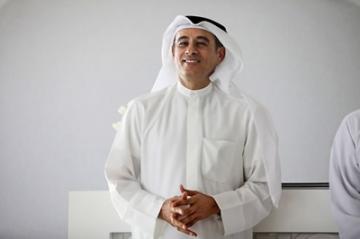Abu Dhabi-backed property firm to revive push into Africa
 Emaar Properties chairman Mohamed Alabbar is pressing ahead with plans to revive an Abu Dhabi-backed development push into North Africa and the Levant through the private property company Eagle Hills
Emaar Properties chairman Mohamed Alabbar is pressing ahead with plans to revive an Abu Dhabi-backed development push into North Africa and the Levant through the private property company Eagle Hills
Emaar Properties chairman Mohamed Alabbar is pressing ahead with plans to revive an Abu Dhabi-backed development push into North Africa and the Levant through the private property company Eagle Hills.
The economies of Egypt, Morocco and Tunisia stand to gain from the current fall in oil prices, which have dropped 50 per cent from their recent peak in June last year, because they are all net importers of fuel. According to Capital Economics, if the drop in oil prices is sustained it could lower the Egyptian government’s energy subsidy bill by about 3 per cent of GDP.
Eagle Hills, an Abu Dhabi-based property development company in which Mr Alabbar is a board member, has been quietly recruiting former Emaar executives and recently merged with Al Maabar, a joint venture company founded by Abu Dhabi’s largest developers.
According to the company’s website, Al Maabar, which was founded as a joint venture company under the direction of the Abu Dhabi government and created by Aldar Properties, Al Qudra Real Estate, Sorouh Real Estate, Mubadala Development, Reem International and Al Reem Investments in 2007, became a subsidiary of Eagle Hills in October last year.
Aldar confirmed that it had sold its stake in Al Maabar in 2013 and other Abu Dhabi partners are understood to have done likewise.
Between them the two companies are understood to own projects worth US$20 billion.
Al Maabar, which means gateway in Arabic, was originally set up to develop large-scale real estate projects in the region, as well as Europe and North Africa.
The company’s projects, most of which were started before the global financial crisis, include a 3.2 million square metre Marsa Zayed mixed-use project in Aqaba in Jordan, a 270-room St Regis hotel and 80 apartments in Amman, Jordan, and 390 upmarket apartments at its Bab Al Bahr scheme near Rabat in Morocco. The company is also understood to have worked on projects in Libya, Syria and Iraq.
However, Al Maabar’s ambitious expansion plans to act as a vehicle for the Abu Dhabi government to develop big real estate schemes in parts of the world where it faces less competition from other developers, were hit by both the global financial downturn and the Arab Spring.
“Eagle Hills appears to be taking on the mantle from Al Maabar as the Abu Dhabi vehicle taking on these large-scale schemes,” said one Abu Dhabi agent who asked not to be named. “Since the summer Arabtec has been taking much more of a back seat with these sort of schemes, which has left the door open for Eagle Hills to come in and revive the Al Maabar role.”
Last summer Eagle Hills presented plans for a multibillion euro Belgrade Waterfront comprising homes, offices, shopping malls, hotels and a 200-metre high Belgrade Tower to the Serbian prime minister Aleksandar Vucic. Eagle Hills hopes to develop the project over the next seven years in partnership with Serbian developers.
Eagle Hills is also working up plans for Century City – a 12.6 square kilometre extension to Nigeria’s capital city Abuja. Also at the planning stage is the 864,484 square metre Marassi Al Bahrain mixed-use project in Bahrain, which will comprise hotels, restaurants, homes, offices, a cruise ship terminal and a shopping mall.
Eagle Hills’ attempts to move into Egypt and Serbia closely mirror those of the Dubai-listed contractor Arabtec which is currently working on plans to build a million low-cost homes in Egypt after a series of political negotiations between Egypt and the UAE.
Last January Arabtec, which is 35.2 per cent owned by the Abu Dhabi fund Aabar, announced it would open a regional headquarters in Belgrade to drive its expansion into the Balkan region.
Eagle Hills executives include the former Emaar group chief executive Low Ping, who left Emaar in late 2013; Salman Sajid, Emaar former head of internal audit and executive director for group operations and business development; former senior director of development at Emaar’s Egyptian arm Emaar Misr, Haitham Fekry; and Tom Bartbridge, former Emaar executive director for HR.
The company has also hired accountant Prakash Chandrabalan as its director for new business in Africa in the hope of expanding its operations across the continent. The company is also understood to be considering plans for a number of projects in Egypt.
“Egypt is very much on the GCC radar as a place to invest,” said Ian Albert, regional director for Colliers International Middle East & North Africa. “There has been a steady flow of developers from the UAE with the likes of Emaar and MAF [Majid Al Futtaim] pressing ahead with schemes there. And they are not alone.
“There is interest from Kuwait, Saudi Arabia, Qatar and across the GCC. Investors from this part of the world feel very comfortable investing in Egypt, especially after the recent disturbances appear to have ended.”
Most Popular
African retail and office property offers ‘significant opportunities’ for investors
Rapid urbanisation and growing consumer wealth on the African continent is providing numerous opportunities for investors wanting to gain exposure to retail and office property developments north of South Africa. ... Full story







